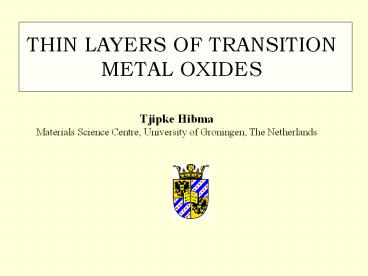THIN LAYERS OF TRANSITION METAL OXIDES - PowerPoint PPT Presentation
Title:
THIN LAYERS OF TRANSITION METAL OXIDES
Description:
THIN LAYERS OF TRANSITION METAL OXIDES Tjipke Hibma Materials Science Centre, University of Groningen, The Netherlands Ultimate goal: Epitaxial growth of perfect thin ... – PowerPoint PPT presentation
Number of Views:552
Avg rating:3.0/5.0
Title: THIN LAYERS OF TRANSITION METAL OXIDES
1
THIN LAYERS OF TRANSITION METAL OXIDES
Tjipke Hibma Materials Science Centre, University
of Groningen, The Netherlands
2
- Introduction to thin film deposition
- Atomic layer-by-layer growth
- - Stoichiometry
- - Surface chemistry
- - Epitaxy
- - Morphology
- - Thickness
- Manipulation of properties, a few examples
3
Atomic Layer-by-Layer Growth
- Ultimate goal
- Epitaxial growth of perfect thin layers with
atomic precision onto (selected parts of) a
single crystalline substrate, in order to
manipulate materials properties (or to design
ultrathin devices).
4
Manipulation of materials properties by
5
LaCrO3-LaFeO3 Atomic Superlattices
K.Ueda, H.Tabata, T. Kawai, Science 280 (1998)
1064
Goodenough-Kanamori rules Cr3-O-Fe3 (d3-d5)
180-superexchange interaction is Ferromagnetic
6
(No Transcript)
7
Molecular Beam Epitaxy (MBE)
- Advantages of MBE
- High purity elemental sources
- Abrupt interfaces
- RHEED growth control
- In-situ surface analysis
- Disadvantages of MBE
- Slow
- Sophisticated and expensive UHV equipment
- Multi-element rate control difficult
8
(UHV-) Pulsed Laser Deposition (PLD)
- Advantages of PLD
- Suitable for complex materials
- Fast and flexible
- (RHEED growth control)
- (In-situ surface analysis)
- Disadvantages of PLD
- Particulates
- Loss of volatile elements
- Small area deposition
9
Growth processes
10
Control of Growth Parameters MBE PLD
Stoichiometry Relative Flux Fn Difficult for ngt2, ALL-MBE Loss of volatile components.
Surface Chemistry Temperature T Energies En Tsubstrate thermal lt0.1 eV Tsubstrate 0.1-10eV (Pback)
Epitaxy Substrate
Morphology (lbl growth mode) Nucleation rate (Fn/Dn )a RHEED (RHEED)
Thickness (nr of layers) Absolute Flux Fn RHEED, ALE Pulses, (RHEED)
11
Atomic Layer-by-layer MBE (ALL-MBE) (Eckstein
and Bosovic, Annu. Rev. Mater. Sci., 25,679,1995)
Atomic absorption flux control and computer
controlled shuttering of individual K-cell.
12
- MBE of Binary Oxides
- Stoichiometric MnOm
- excess oxygen
- Nonstoichiometric MxOy
- vary FM/FO, determine x afterwards
- Fe3-dO4, Moessbauer Spectroscopy
- CrOx , XPS
- VOx, TiOx (0.8ltxlt1.3), 18O-RBS
13
18O- RBS
RBS spectra of 1.8 MeV He ions scattered from
V2O3 film on Al2O3 (0001)
VOx film on MgO (100)
14
18O- RBS of VOx
15
- Elements
- surface diffusion, nucleation
- Binary Oxides
- diffusing species M, O, MO ??
- Complex Oxides
- ?????
16
- Epitaxy
- Well-defined orientation relationship
between substrate and film lattice. - Coherent epitaxy
strain
(misfit f Da/a)
17
Critical Thickness
Dislocation formation
Critical thickness
18
Critical Thickness of CoO/MgO(001)
19
Non-specular diffraction spots
coherent growth
20
Non-specular diffraction spots
relaxed growth
21
The three growth modes
Wetting Criterion
Layer-by-layer
Layer 3D islands
3D-islands
22
RHEED
MgO(001)
Fe3O4/MgO(001)
k
k
23
RHEED Patterns
24
Transmission RHEED Pattern
TiOx/MgAl2O4(001) vacancy ordered phase
25
RHEED Oscillations
Kinematic diffraction / Step density models
Do not explain - phase shifts !!! -
in-/out of phase amplitude - damping due
to dynamic and incoherent scattering effects)
? only the ML period is reliable parameter
26
- in-situ quartz monitor, RHEED oscillations
- ex-situ X-ray Reflectivity, RBS
27
(No Transcript)
28
Transition metal oxides TMO
29
Metastable Chromium Monoxide CrxO
(O. Rogojanu)
- Chromium monoxide CrO does not exist as a bulk
material, but can be grown on cubic substrates as
CrxO (0.67ltxlt1) . - Cr2/Cr3 iso-electronic with Mn3/Mn4 (d4/d5)
- ? SCOO in Cr-oxides ?
30
Rocksalt-Cr2O3/MgO(001)
(O. Rogojanu, S.Hak)
Refinement of data collected at ID10,ESRF 1/3
Cr-sites are vacant
LEED pattern of CrOx/MgO(001)
Areal XRD picture of CrOx/MgO(001).
31
Coherent VOx layers on MgO and STO
VOx on MgO (aMgO4.21 Å) tensile strain
(002)MgO
(004)MgO
(002)VOx
VO(113)
(004)VOx
MgO
(113)
MgO
(113)
VOx on STO (aSTO3.90 Å) compressive strain
STO(113)
(002)STO
(004)STO
VO(113)
(002)VOx
(004)VOx
(004)VOx
2Theta-omega scan
32
MI-transition in strained VOx layers
(A.D.Rata)
33
Compressed metallic VOx shows upturn of r and
positive MR at low T
34
XMLD of strained CoO
(S. Csiszar, M. Haverkort, H. Tjeng)
Co L3-edge
eg
t2g
dxy
dxz,dyz
Co L3-edge
eg
dxz,dyz
t2g
dxy
35
Nonpolar OFeOFeO stack ?
End t 105s
Start t 0s
36
- The ideal of atomic layer-by-layer growth can be
approached using MBE and UHV-PLD techniques. - However,
- Control of stoichiometry, completeness and
structure of atomic layer during growth is still
unsatisfactory. - Knowledge of surface chemistry is almost fully
lacking. - Postgrowth characterisation of composition and
structure is a tedious and tough job.
37
Tjipke Hibma Henk Bruinenberg Wilma
Eerenstein Diana Rata Sjoerd Hak Szilard Csiszar
MSC-cooperations Tjeng, Sawatzky (electron
spectroscopy) Niesen, Boerma (Moessbauer
spectroscopy, RBS) Palstra (transport
measurements)































